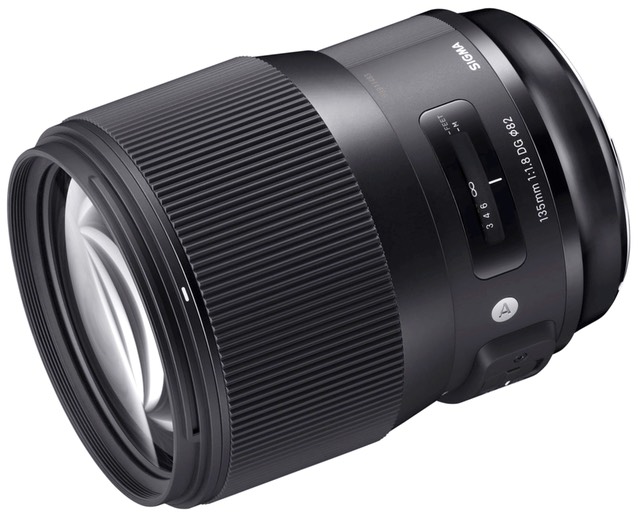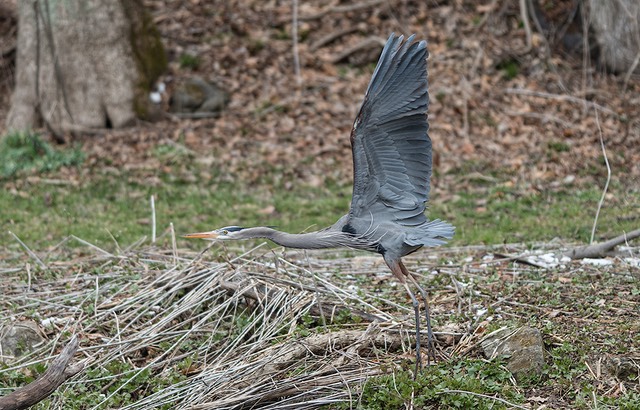
What is It?
The Sigma Art fast prime set is getting filled in very nicely, now extending from 14mm to 135mm. The 135mm is an f/1.8 optic, not f/1.4 like some of the Art primes, but that probably saved us all from having to work out at the gym more.
At 40.9 ounces (1130g), this lens is not light. Indeed, since it's only 4.5" long (114.9mm) and 3.6" in diameter (91.4mm), it feels like you're picking up small gold bar.
Inside there's a lot of glass. Not so much in terms of elements, as there's only 13 of those in 10 groups. It's that so many of those elements are big. You can't see that from the outside, of course, but much of that weight is simply big thick glass elements packed together, particularly towards the front of the lens. Two of the elements are SLD glass, two FLD.
Apertures range from f/1.8 to f/16, with a 9-blade rounded aperture opening. Up front, we've got an 82mm filter ring and a bayonet lens hood mount (lens hood included, as is a carrying case for the lens). I should point out that the aperture is electronically controlled on Nikons (e.g. E-type), so watch camera compatibility.
Close focus is 34.4" (.875m) and nets out to a pretty nice 1:4.3 maximum magnification. Not macro, but this lens will let you come in tight to subjects, even human ones. Focus pull is a bit over a quarter of a turn, indeed, slightly awkwardly so (see handling, below). There's a focus scale marked in feet and meters, but no DOF markings. And yes, as with most lenses using low dispersion glass, you can focus past infinity at many temperatures.
The lens has two switches, one for AF/MF, and a three position focus limiter switch (all, near, far). The sample lens was manufactured in 2017.
The 135mm f/1.8 Art lens is made in Japan and retails for US$1399. It's available in Canon EF, Nikon F, Sigma SA, and Sony FE mounts.
Source of the lens: B&H loaner
How's it Handle?
It's a big dense package that reminds me a lot of hanging the Nikkor 105mm f/1.4 off the front of my cameras. On the light cameras, such as the D750, you're going to definitely feel front heavy. On the D5, not an issue at all. The D850 is somewhere in between.
The focus ring was smooth and very wide (so easy to find), though the minimum to maximum throw turn is more than you want to do in one hand twist. But I'm not sure there's a time when you manually move focus from 0.857m to infinity, so this is mostly ignorable.
One thing that was highly unusual is that the feet markings on the distance scale are almost unreadable even under bright light. It's like someone used the wrong paint, there's not only zero reflectance, but the markings are dim on top of that.
Overall than that, nothing to complain about.
How's it Perform?
Focus: Like the 85mm, there's a little slide-to-focus in low light. But shooting Frank (see below), the lens was handling focus just fine. Remember that you've got a focus limiter if you don't want the lens to go all the way from .875m to infinity.
Sharpness: While not quite the sharp knife the 85mm Art is, the 135mm comes remarkably close. Center is excellent from wide open until diffraction starts taking your acuity away. Corners are, well, uh, I'm going to call them very good at f/1.8, but I'm pushing my definition a bit. It's rare to see a fast lens this long so sharp in the corner, though, so I'm going to give the Sigma the benefit of the doubt. Put it this way: the corners are likely to be better than you hoped at f/1.8. The corners are clearly very good to excellent at f/4, so stopping down even a little bit should get you want you need if you need edge-to-edge sharp.

It's the return of Frank, last seen in the 70-300mm DX review. Because he's on the far bank away from me, this is about a 9mp crop from the D850. Yep, the camera/lens combo was able to pick him off a very busy background and put the focus in the right place, and the detail is actually really good for being at f/1.8.

Several frames later, everything's still very nice. Again, this is f/1.8, not the strongest aperture on this lens yet the detail is clearly there.
Linear distortion: Like the 85mm, the 135mm has very little pincushion distortion. At about a fifth-of-a-percent, I'm not sure you'd tend to correct it, but it looks very regular to me, so should be easily correctable.
Vignetting: Surprise! I wish all modern fast lenses were so tame. Less than a stop and half wide open, and by f/2.8 we're well under a half stop and unnoticeable. Very nice performance for a fast telephoto lens.
Chromatic aberration: I'm starting to wonder if Sigma was delivered a box of CA-Away and they sprayed it on all recent lenses. Lateral CA is low enough that I can't even vouch for the accuracy of my numbers. Longitudinal CA is present, but in reasonable low levels and mostly gone by f/4. I've seen far, far worse from fast primes than this lens delivers, so I'm going to call that good performance.
Bokeh: Like the 85mm, this is some of Sigma's better work. Minimal outer edge brightness, no real visible onion skin, and really only some fringe color due to the longitudinal CA. Corners lose shape, indicating coma.
Final Words
Another really impressive prime from Sigma. Hmm. Nikkor 58mm, Sigma 85mm, Nikkor 105mm, Sigma 135mm. That's one fine lens set that takes you across from long normal to short telephoto. If you're not getting great images with tight acuity from a set like that, well, something is wrong with you, not the lenses.
Sigma's definitely upped their game with many of the Art lenses. The 135mm f/1.8 shows a really solid balance of the optical tradeoffs, with an emphasis on sharpness and reducing any easily-visible artifacts. If you like this focal length, this is the best option I've seen to date on the high megapixel count cameras. It's good. Real good.
Recommended (2018 to present)